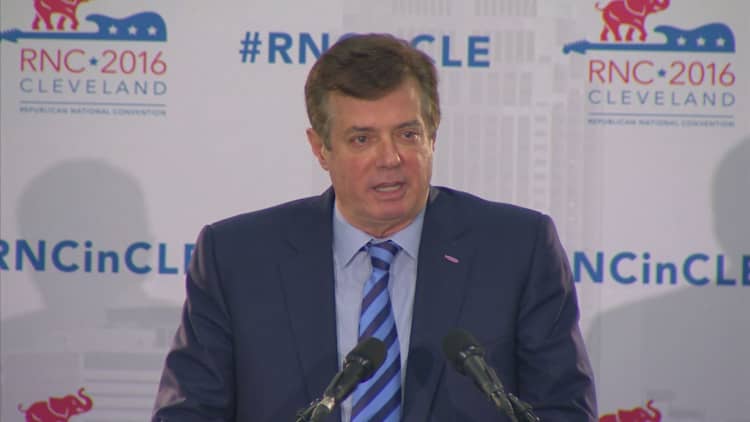Killing Obamacare was a lot harder than expected, and it could be the biggest test yet for the 4-month-old Trump rally.
Stocks are in a holding pattern, waiting to see if President Donald Trump and the Republican House can work out their differences on a health-care replacement bill and put the president's pro-growth agenda back on track.
"It certainly is the biggest test of the Trump rally outside of how he's going to deal with geopolitical issues," said Art Hogan, chief market strategist at Wunderlich Securities. "This has indications for the timing of policy implementation. It's not just pushing it out, but it's the loss of the leverage he has when he gets to tax reform. The harder this is, the harder tax reform is."
The congressional wrangling over health care this week has served as a first warning that Trump's policy promises alone may not be enough to sustain the bull market, and that the president may not have as easy a time getting the Republican Congress to line up behind him as some investors thought.
"The way I view it is if you're on the Trump train, you're kind of stuck in between stations right now. The idea is he could very well get the votes needed, and that would clear the way for health-care reform and then, tax reform comes next. The probability of that happening seem to be lower than they were just a few days ago," said Michael Arone, chief investment strategist of the U.S. SPDR business at State Street Global Advisors.
The sparring over health-care replacement pits the conservative Freedom Caucus against House Speaker Paul Ryan and other Republican members. The White House continued lobbying efforts Wednesday. President Trump met Tuesday with GOP House members and urged them to approve the new bill while warning them they could lose their congressional seats if they do not get behind the repeal of Obamacare.
"I think it shows he doesn't have a magic wand to get his policy agenda passed at least in a rapid fashion. We'll get some change, but it's not going to be as promised and as quick," said Hogan.

For the first time since Election Day, stock investors had their doubts about the ability of the president to push his plans through Congress, delivering the tax reform and other policies the market has been moving higher on.
The House vote to replace Obamacare could still succeed Thursday, but the fact the president had to expend political capital to make it happen is illustrating that the path for other policies, like much anticipated tax reform, might not be as easy as expected. That's important since the market has been rising on the prospect of tax reform for corporations and individuals, as well as other fiscal policies.
This worry that all is not rosy helped feed the biggest stock market decline since September on Tuesday and hung over the market Wednesday. Stocks, however, reversed early losses and ended Wednesday mixed. Still, analysts are pointing to Thursday's House vote on health-care reform as a major next catalyst for the market.
Conservative members of the Freedom Caucus in the House are so far indicating opposition to the replacement for Obamacare. Caucus Chairman Rep. Mark Meadows, R-N.C. said Wednesday there are still not enough votes to pass, and a caucus spokeswoman said there are more than 25 members of that group who plan to vote against it.
The lack of support for the bill comes a week after the Federal Reserve raised interest rates and signaled two more rate hikes this year, a factor also weighing on sentiment as investors look at rate increases against a backdrop of sluggish economic growth.
"I think what happened was the bull market was largely based on the idea that monetary policy and fiscal policy would work together to boost economic growth, and I think that's what really pushed up stock prices. What we're finding out is monetary policy is getting tighter and fiscal policy is further down the horizon than we anticipated," said Arone.
I think the Republicans and markets generally overplayed their hands. They had the presidency and both houses of Congress so everything was going to be a slam dunk. Obviously that was not going to be the case.Michael Aronechief investment strategist, State Street Global Advisors
He said falling oil prices have also become a concern for the market, as Brent crude teetered just above $50 per barrel Wednesday, after declining 1.4 percent.
"It's certainly unnerved the market. I think the Republicans and markets generally overplayed their hands. They had the presidency and both houses of Congress so everything was going to be a slam dunk," he said. "Obviously that was not going to be the case."
Arone said this is the first test of how Trump policy will be translated into law, and if it succeeds, the market should do better. However, if the vote fails, there could be more selling.
Strategists say the market is moving to price in a longer timetable for pro-growth reforms than previously expected. The administration has said tax reform should be completed by August when Congress goes on break, but if dealing with the health-care bill drags on, those efforts could take until next year.
"That will result in stock prices declining some more. I do believe that was built into some of the earnings forecasts and economic growth forecasts," said Arone. He said there's a chance stocks could decline 5 to 10 percent if the House effort on health care fails. "That's only if it appears the legislative agenda is at risk."
Arone does, however, expect stocks to be higher at the end of the year, helped by improving positive earnings growth.
"I still expect the S&P will get somewhere between 6 to 8 percent return this year," he said.
The closed up 4 points at 2,348 on Wednesday, after declining more than 1 percent Tuesday.


